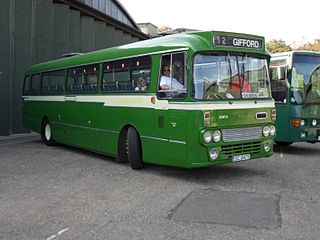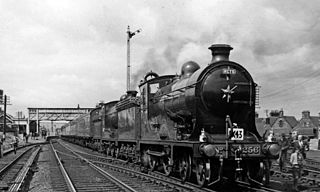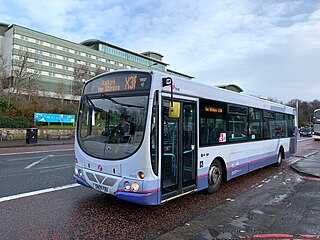
The Scottish Borders is one of 32 council areas of Scotland. It borders the City of Edinburgh council area, Dumfries and Galloway, East Lothian, Midlothian, South Lanarkshire, West Lothian and, to the south-west, south and east, the English unitary authorities of Cumberland and Northumberland. The administrative centre of the area is Newtown St Boswells.

Dalkeith is a town in Midlothian, Scotland, on the River Esk. It was granted a burgh of barony in 1401 and a burgh of regality in 1540. The settlement of Dalkeith grew southwestwards from its 12th-century castle . Dalkeith has a population of 12,342 people according to the 2011 census.

Jedburgh is a town and former royal burgh in the Scottish Borders and the traditional county town of the historic county of Roxburghshire, the name of which was randomly chosen for Operation Jedburgh in support of the D-Day invasion.

Roxburghshire or the County of Roxburgh is a historic county and registration county in the Southern Uplands of Scotland. It borders Dumfriesshire to the west, Selkirkshire and Midlothian to the northwest, and Berwickshire to the north. To the southwest it borders Cumberland and to the southeast Northumberland, both in England.

Eastern Scottish Omnibuses Ltd. was a bus and coach operator based in Edinburgh, Scotland and a subsidiary of the Scottish Bus Group. Eastern Scottish was formed in June 1985 from the main part of Scottish Omnibuses Ltd., which had itself traded as 'Eastern Scottish' since the 1960s. Following privatisation in 1990 the company traded as 'SMT' reviving the original name of the company. It operated until 1994, when it became part of GRT Bus Group plc.
Lowland Scottish Omnibuses Ltd was a bus operator in south eastern Scotland and parts of Northern England. The company was formed in 1985 and operated under the identities Lowland Scottish, Lowland and First Lowland / First SMT, until 1999 when the company's operations were combined with the operations of Midland Bluebird in a new company, First Edinburgh Ltd. As of 26 March 2017 these operations were transferred to West Coast Motors.

The Waverley Route was a railway line that ran south from Edinburgh, through Midlothian and the Scottish Borders, to Carlisle. The line was built by the North British Railway; the stretch from Edinburgh to Hawick opened in 1849 and the remainder to Carlisle opened in 1862. The line was nicknamed after the immensely popular Waverley Novels, written by Sir Walter Scott.

Berwickshire, Roxburgh and Selkirk is a constituency of the British House of Commons, located in the south of Scotland within the Scottish Borders council area. It elects one Member of Parliament (MP) at least once every five years using the first-past-the-post system of voting.

A common riding is an equestrian tradition mainly in the Scottish Borders in Scotland. Male and female riders ride out of the town and along its borders to commemorate the practice from 13th and 15th centuries where there were frequent raids on the Anglo-Scottish border known as the Border Reivers and also to commemorate the Scottish defeat at the Battle of Flodden. Today, the common ridings, rideouts, or riding of the marches continue to be annual events celebrated in the summer in the Borders of Scotland. Each town may have many rideouts over their festival week, usually having one on festival day. Some towns re-enact historic 'common ridings' – although many others have well-established 'festival rides' that are cemented within their town's history. The common riding towns are: Berwick-upon-Tweed, Hawick, Selkirk, Langholm, Lockerbie, Jedburgh, Coldstream, Penicuik, West Linton, Lanark, Lauder, Edinburgh, Melrose, Musselburgh, Galashiels, Duns, Sanquhar, and Peebles.

First South East & Central Scotland, formerly known as First Scotland East, was an operator of both local and regional bus services in Clackmannanshire, East Dunbartonshire, East Lothian, Falkirk, Fife, Midlothian, North Lanarkshire, Scottish Borders, Stirling and West Lothian, as well as the cities of Edinburgh and Glasgow, Scotland. It was a subsidiary of FirstGroup, which operates bus, rail and tram services across the United Kingdom and Ireland.

Galashiels is a railway station on the Borders Railway, which runs between Edinburgh Waverley and Tweedbank. The station, situated 33 miles 22 chains (54 km) south-east of Edinburgh Waverley, serves the town of Galashiels in Scottish Borders, Scotland. It is owned by Network Rail and managed by ScotRail.

Tweedbank is a railway station on the Borders Railway, which runs between Edinburgh Waverley and Tweedbank. The station, situated 35 miles 34 chains (57 km) south-east of Edinburgh Waverley, serves the village of Tweedbank in Scottish Borders, Scotland. It is owned by Network Rail and managed by ScotRail.

Crossgates Coaches was a bus operator in Wales which was dissolved in February 2015. Formerly operating contracts for Powys County Council, following loss of these contracts in 2007, the site was leased and staff transferred under TUPE law to Veolia Transport Cymru, a division of Veolia Transport.

West Coast Motors is a bus, coach and ferry operator, based in Campbeltown, Scotland. The company also operates under the name Borders Buses in the Scottish Borders and formerly under the Glasgow Citybus brand in Greater Glasgow.
The Peebles Railway was a railway company that built a line connecting the town of Peebles in Peeblesshire, Scotland, with Edinburgh. It opened on 4 July 1855, and it worked its own trains.
The Selkirk and Galashiels Railway was a railway company that built a branch line connecting Selkirk, Scottish Borders, with the mainline network at Galashiels. The 5-mile (8.0 km) line opened in 1856 and was well used in the period down to 1914. Road transport from about 1923 became a serious competitor and the usage of the line declined steeply. Economy measures did little to retrieve the situation and the passenger service was withdrawn in 1951. Goods traffic continued for a period, but in 1964 that too was withdrawn. There is no railway use of the line now.

The Borders Railway connects the city of Edinburgh with Galashiels and Tweedbank in the Scottish Borders. The railway follows most of the alignment of the northern part of the Waverley Route, a former double-track line in southern Scotland and northern England that ran between Edinburgh and Carlisle. That line was controversially closed in 1969, as part of the Beeching cuts, leaving the Borders region without any access to the National Rail network. Following the closure, a campaign to revive the Waverley Route emerged. Discussion on reopening the northern part of the line came to a head during the early 2000s. Following deliberations in the Scottish Parliament, the Waverley Railway (Scotland) Act 2006 received royal assent in June 2006. The project was renamed the "Borders Railway" in August 2008, and building works began in November 2012. Passenger service on the line began on 6 September 2015, whilst an official opening by Queen Elizabeth II took place on 9 September.

The Railway of Kelso and Jedburgh branch lines was a 'network' of three distinct railway services serving Kelso in the Scottish Borders.

Whitehill is a village in Midlothian in the south-east of Scotland, approximately 1.5 miles (2 km) south-east of Dalkeith and 8.5 miles (13.6 km) from Edinburgh. The village is situated on the northwest slope of the Mayfield-Tranent ridge which spans the border between Midlothian and East Lothian. Both road entrances to the village offer magnificent panoramic views over Edinburgh, the Firth of Forth and the Pentland Hills.

Borders Buses operates both local and regional bus services in the City of Edinburgh, East Lothian, Midlothian and Scottish Borders, Scotland, as well as Cumbria and Northumberland, England. It is a subsidiary of West Coast Motors.





















